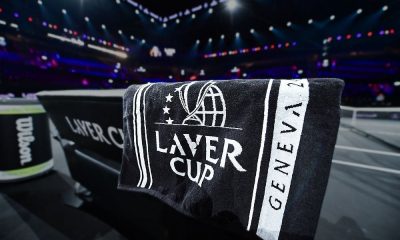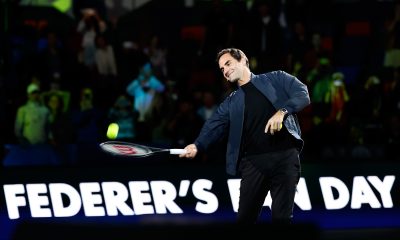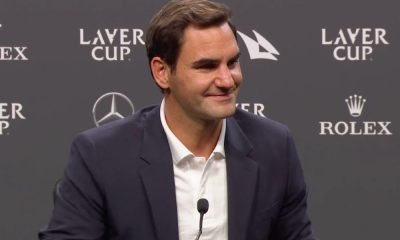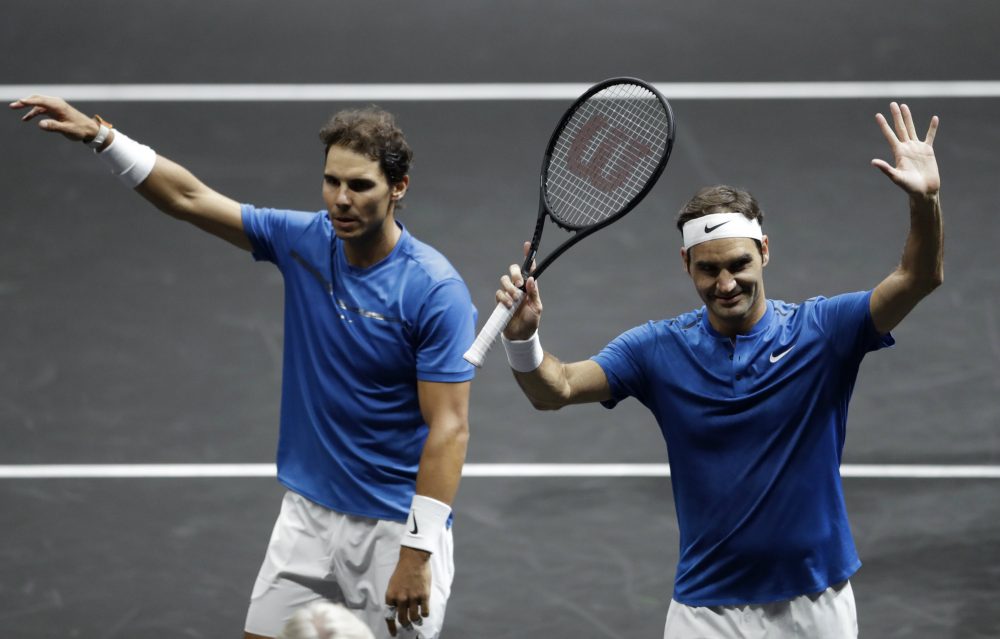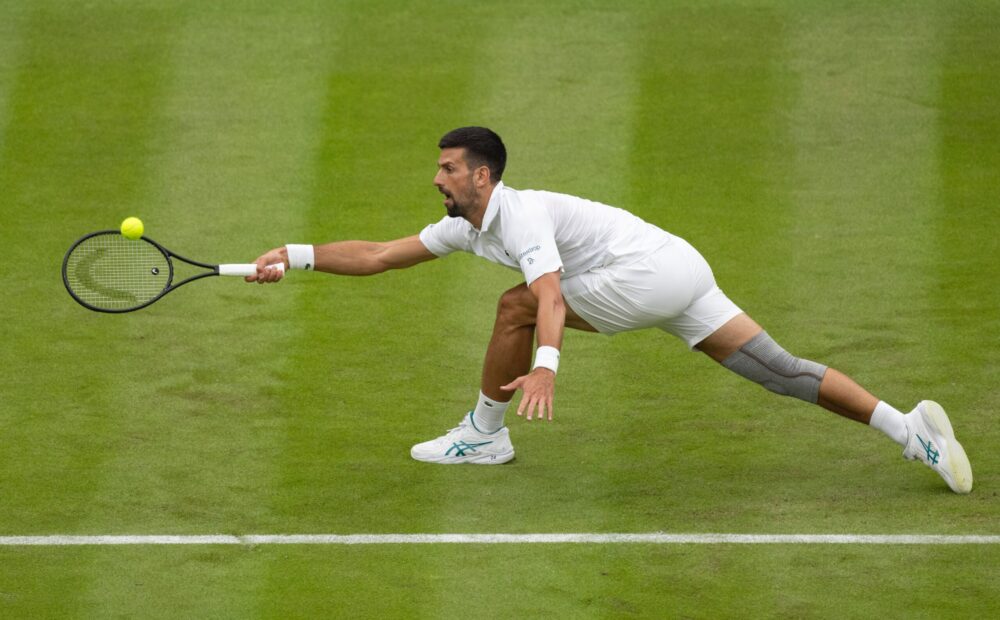TENNIS ATP Monte-Carlo – R. FEDERER/J. Tsonga 2-6, 7-6, 6-1 An Interview with Roger Federer.
Q. You must be happy with the way you got through that. Two points from defeat. Get out of jail, so to speak.
ROGER FEDERER: Yeah, not only was it close in the breaker, but I think I was down 6 5, Love 30 maybe. A tough point at 15 30 as far as I remember with a half volley backhand defense kind of thing. It wasn’t looking good there. Clearly was quite frustrating for a long period of time, you know, missing all those breakpoints.
It was a tough day at the office. I’m happy I found the way to tough is out.
Q. What sort of explanation do you give to yourself when you are on court and you miss all those breakpoints? Do you get more and more nervous?
ROGER FEDERER: Yeah, it clearly gets more difficult as you go along because I really should have broken in the first three or four, I don’t remember exactly. I don’t remember what happened when, but when I had the dropshot early, then I think twice actually I had a dropshot opportunity which he played, I got to quite easily, and I didn’t win the point on one of them. It’s how did I get to missing that many?
I think it started that I should have never not broken that early. Then it got into that habit of, okay, he’s always going to be defensive on the breakpoint and I’m not going to be able to find a way to start the point neutral. That was a problem for me and something I need to fix for the next match if it happens again.
Q. Tsonga was saying the conditions changing seemed to favor you more in the third set, to which Stan responded with a sarcastic message on Twitter. What do you make of that, that supposedly the conditions suited you?
ROGER FEDERER: I don’t think it was that much of a change, to be quite honest. I mean, it did go through phases and it definitely got cooler rather than warmer. That’s logical.
But I don’t think, like, you know, there was any wind change or any crazy, like, quickness change in the way it played. I just think it got later in the day.
We played in those conditions a million of times. I think conditions were quite nice out there from the start of the match till the finish. Not too much wind. The ball wasn’t bouncing all over the place.
For both of us at times it was quite frustrating that we weren’t playing better. I don’t think our best matched up sometimes. When he was playing well, he was in the lead. Finally when I got the lead, I was dominating.
Q. You’re a very confident player. Were you surprised the way the third set went? You kept your focus and confidence. You just kept winning games.
ROGER FEDERER: Well I figured, like, winning that second set was tough for Jo. It was good for me. I just thought it was really important to hold my first service game, not kind of like play a nothing game and get down a break, then sort of give him the lead right away again. It was my opportunity to be in the lead for the first time in the match.
Then I really believed that eventually I was going to come through. It’s not possible to go through that many breakpoints. I was playing good enough to make the break and then serve my way home. That’s exactly kind of what happened.
It wasn’t just all negative, you know. The important thing was to carve out the positive stuff in my mind even midway through the first set, midway through the second set when things got tough.
I definitely think Jo didn’t serve as well or as hard as he could have in the third set. I don’t know why that is. But I took advantage of that at the end. That’s all that matters for me right now.
Q. It’s obviously frustrating when you have all those breakpoint chances. Were you happy with your composure? You didn’t let it show it was getting to you.
ROGER FEDERER: I was frustrated. Let’s be honest. I did chuck a ball out of the stadium. I did scream sometimes. I was aggravated to a degree, but not to the extent where I totally lost it.
I was not actually playing poorly or terribly. I was just taking wrong decisions sometimes. That kind of matched up sort of with Jo’s genius play sometimes, and his erratic play as we know it.
For me, I was just hoping my game was not going to go down because I was missing breakpoints. So I was very happy with the composure overall. That got me home at the end, I think.
THE MODERATOR: Questions in French, please.
Q. This is your fourth time in the semifinals. What does that mean for you to be in the semis of your first clay court tournament of the year?
ROGER FEDERER: It helps you feeling more relaxed for the following Masters 1000 tournaments because you don’t have to run after your first victory on clay. It helps you knowing where you stand. You have information about what you need to work on. Also you can be more relaxed and play without pressure which is pleasant because we often are under a lot of pressure.
I know here I am not the most favored player. But I know tomorrow might be an opportunity for a good performance for me. There’s nothing guaranteed, but I’ll try.
Q. Two Swiss players are in the semis here. This shows that Swiss tennis is experiencing a very good period.
ROGER FEDERER: Yes, indeed, it’s fabulous. When Stan made it into the top 10 in Rome in the finals, that was already a great moment. But now we’re 3 and 4, so in the draws we are far apart, and this is good because we have more opportunities of having one of us going further in the tournament.
What Stan has been doing during the past six or nine months is extraordinary. On my side, after my problems last summer, I am now back in better shape.
Q. What do you think of the semifinal coming up, either Novak or Garcia López?
ROGER FEDERER: I know Garcia López very well. He will play from the baseline. He will move well and slide well. I know what to expect against him. If it is Novak, we know he moves very well and he serves better than Garcia López.
If I play Garcia López, the match will be in my hands. If I play Novak, the match will be in his hands.
But playing Novak in Indian Wells and Dubai gave me information that I can use. I can prepare well for a possible match against Novak.

 Hot Topics3 days ago
Hot Topics3 days ago
 Latest news3 days ago
Latest news3 days ago
 Hot Topics2 days ago
Hot Topics2 days ago
 Hot Topics3 days ago
Hot Topics3 days ago
 Focus2 days ago
Focus2 days ago
 Focus2 days ago
Focus2 days ago
 Focus2 days ago
Focus2 days ago
 Hot Topics2 days ago
Hot Topics2 days ago



